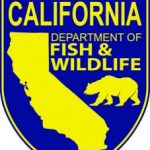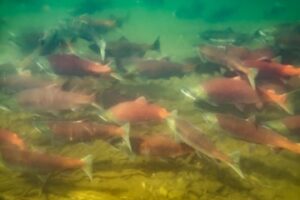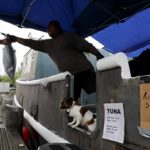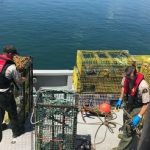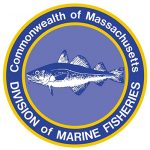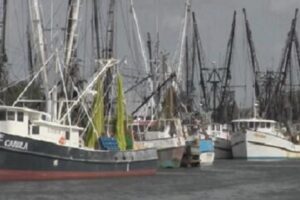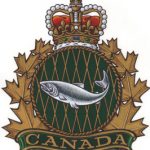Daily Archives: September 27, 2024
Pollock fishery shut down early after unprecedented salmon bycatch in Gulf of Alaska
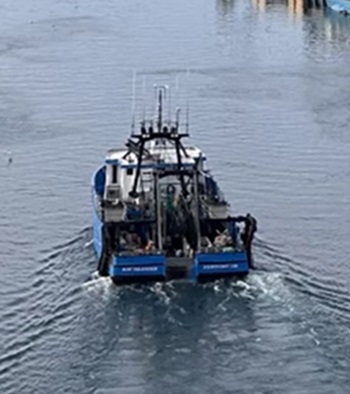 The National Marine Fisheries Service [NMFS] announced Wednesday, Sept. 25 that it was shutting down the rest of the Central Gulf of Alaska pollock season. That’s after reports that the trawler fleet incidentally caught “unprecedented amounts of Chinook salmon” this week, which comes as the issue of salmon bycatch faces mounting scrutiny. Jonathan Kurland, the Fisheries Services acting regional administrator for the Alaska region. said the closure was necessary to “prevent exceeding the 2024 Chinook salmon prohibited species catch limit.” The Kodiak-based trade group Alaska Groundfish Data Bank said in a press release on Sept. 24 that two fishing vessels trawling for pollock on Sept. 22 came upon a hotspot of Chinook salmon, which the organization described as an “extremely unprecedented amount.” The vessels were in an area adjacent to Kodiak Island. more, >>CLICK TO READ<< 15:01
The National Marine Fisheries Service [NMFS] announced Wednesday, Sept. 25 that it was shutting down the rest of the Central Gulf of Alaska pollock season. That’s after reports that the trawler fleet incidentally caught “unprecedented amounts of Chinook salmon” this week, which comes as the issue of salmon bycatch faces mounting scrutiny. Jonathan Kurland, the Fisheries Services acting regional administrator for the Alaska region. said the closure was necessary to “prevent exceeding the 2024 Chinook salmon prohibited species catch limit.” The Kodiak-based trade group Alaska Groundfish Data Bank said in a press release on Sept. 24 that two fishing vessels trawling for pollock on Sept. 22 came upon a hotspot of Chinook salmon, which the organization described as an “extremely unprecedented amount.” The vessels were in an area adjacent to Kodiak Island. more, >>CLICK TO READ<< 15:01
Tribal groups, seeking restrictions on Alaska’s Bering Sea trawlers, get day in court
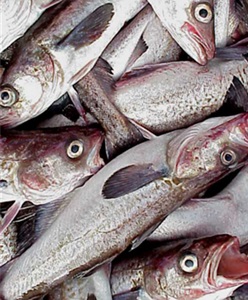 U.S. District Court Judge Sharon Gleason heard oral arguments Thursday in a lawsuit filed by two of Alaska’s largest tribal groups against federal managers of the state’s groundfish trawl fisheries. The Association of Village Council Presidents and the Tanana Chiefs Conference claim the federal government has failed to adjust trawling rules in the Bering Sea and off the Aleutian Islands to compensate for the ongoing salmon crisis on Alaska’s Interior rivers. Victory by the plaintiffs could lead to new restrictions on the world’s largest trawl fishery. If plaintiffs lose, the status quo is likely to continue. On Thursday, Gleason asked plaintiffs whether they’re seeking a halt to trawl fishing in the Bering Sea. No, the plaintiffs said. more, >>CLICK TO READ<< 11:27
U.S. District Court Judge Sharon Gleason heard oral arguments Thursday in a lawsuit filed by two of Alaska’s largest tribal groups against federal managers of the state’s groundfish trawl fisheries. The Association of Village Council Presidents and the Tanana Chiefs Conference claim the federal government has failed to adjust trawling rules in the Bering Sea and off the Aleutian Islands to compensate for the ongoing salmon crisis on Alaska’s Interior rivers. Victory by the plaintiffs could lead to new restrictions on the world’s largest trawl fishery. If plaintiffs lose, the status quo is likely to continue. On Thursday, Gleason asked plaintiffs whether they’re seeking a halt to trawl fishing in the Bering Sea. No, the plaintiffs said. more, >>CLICK TO READ<< 11:27
Maine’s massive “floating wind” folly — my report
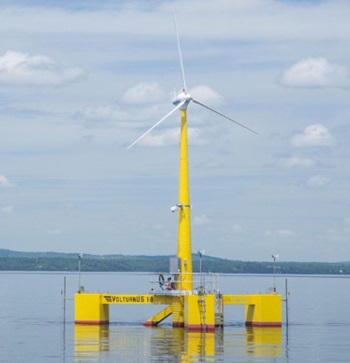 Below is my Executive Summary, followed by the latest bad news on this ongoing silly saga. This report examines several fundamental aspects of the State of Maine’s offshore wind development plan. It is divided into two parts. Part 1 examines certain economic issues, such as feasibility, cost, and progress to date. Part 2 explores the proposed development as it relates to the entire Gulf of Maine, namely because the project has not advanced to the point where the State of Maine’s responsibilities have been defined. The offshore wind plan calls for development of 3,000 MW of generating capacity, an amount that is roughly double Maine’s average electricity usage. The viability of Maine’s offshore wind plan depends entirely on the massive transformation of the state’s grid from fossil fuel use to electrification. It is clear that the citizens of Maine have not been informed of this vast transformation requirement. They have certainly not approved it. more, >>CLICK TO READ<< 09:34
Below is my Executive Summary, followed by the latest bad news on this ongoing silly saga. This report examines several fundamental aspects of the State of Maine’s offshore wind development plan. It is divided into two parts. Part 1 examines certain economic issues, such as feasibility, cost, and progress to date. Part 2 explores the proposed development as it relates to the entire Gulf of Maine, namely because the project has not advanced to the point where the State of Maine’s responsibilities have been defined. The offshore wind plan calls for development of 3,000 MW of generating capacity, an amount that is roughly double Maine’s average electricity usage. The viability of Maine’s offshore wind plan depends entirely on the massive transformation of the state’s grid from fossil fuel use to electrification. It is clear that the citizens of Maine have not been informed of this vast transformation requirement. They have certainly not approved it. more, >>CLICK TO READ<< 09:34
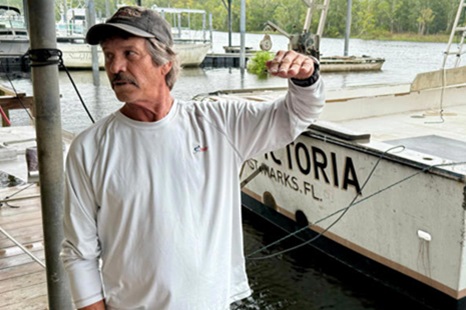
‘Still floating’: Florida fishermen and boaters ride out Hurricane Helene
Winds whipped over 100 mph. Waters threatened hundreds of miles of Florida coast. And Philip Tooke managed to punch out a terse but frantic message from his phone as he sat riding out Hurricane Helene – not in his house, but on his boat. “Lost power,” he wrote from St. Mark’s, 30 miles south of Tallahassee and 20 miles away from where Hurricane Helene hit the mouth of the Aucilla River. But, he adds: “Still floating.” Tooke, the 63-year-old owner of a local seafood market, and his brother are spending the hurricane aboard their fishing boats. The pair are among the Floridians who took to the water for their survival. They did so despite evacuation orders made ahead of the Category 4 hurricane and grisly warnings that foretold death for those who stayed. Video, Photo gallery, more, >>CLICK TO READ<< 08:05
Editorial: Save commercial fishing industry
 Commercial fishing operators working out of the harbor in West Ocean City have been cast adrift, as the push to build an offshore wind farm about 12 miles east of Ocean City has rolled over their concerns. As was noted in a meeting Tuesday between Department of Natural Resources officials and commercial fishing operators, the construction of a maintenance facility at the commercial harbor could leave the few boats still operating there without space to unload their catch. No one, outside of the fishing community itself, apparently thought of that problem and one suspects that the state and federal governments would advise members of that industry to produce their own solution, which they don’t have the resources to do. more, >>CLICK TO READ<< 06:35
Commercial fishing operators working out of the harbor in West Ocean City have been cast adrift, as the push to build an offshore wind farm about 12 miles east of Ocean City has rolled over their concerns. As was noted in a meeting Tuesday between Department of Natural Resources officials and commercial fishing operators, the construction of a maintenance facility at the commercial harbor could leave the few boats still operating there without space to unload their catch. No one, outside of the fishing community itself, apparently thought of that problem and one suspects that the state and federal governments would advise members of that industry to produce their own solution, which they don’t have the resources to do. more, >>CLICK TO READ<< 06:35

































